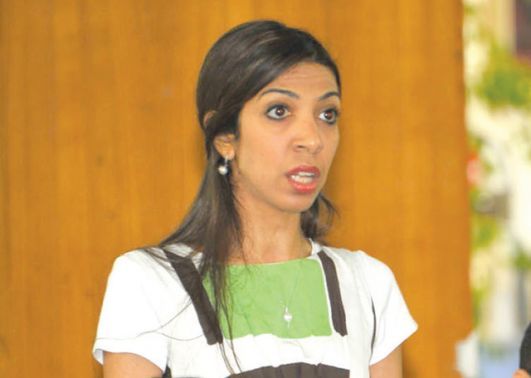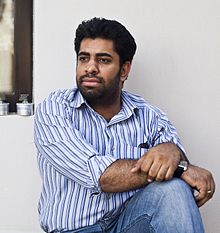9 Jul 2013 | Middle East and North Africa
Despite promising reform and introducing a new constitution in 2011, Morocco’s treatment of dissidents indicates the changes were just window dressing, Samia Errazzouki writes
Morocco’s King Mohammed VI announced a constitutional reform process during a 9 March 2011 speech, following popular protests organised by the 20 February Movement. Regime supporters and allies — France and the United States — hailed the move towards reform as “unprecedented.” Morocco was soon referred to as the “model for the region.”
But the government’s repression of freedom of expression has remained steadfast even after the new constitution.
Most recently, in March 2013 dissident rapperMouad Belghouat (alias El Haqed) was released from jail after he served his second, year-long prison sentence over his anti-regime lyrics, which were described as “undermining state authority.”
 In February 2012, 18-year old Walid Bahomane was charged with “defaming Morocco’s sacred values” after he posted a caricature of Mohammed VI on Facebook. Even though he did not create the illustration, Bahomane was convicted and sentenced to one year in prison for the act of sharing the image.
In February 2012, 18-year old Walid Bahomane was charged with “defaming Morocco’s sacred values” after he posted a caricature of Mohammed VI on Facebook. Even though he did not create the illustration, Bahomane was convicted and sentenced to one year in prison for the act of sharing the image.
In the same month, Abdessamad Hidour, an activist with the 20 February Movement faced similar charges after a video of him criticising Mohammed VI was uploaded on Youtube. In the video, he likened Mohammed VI’s reign to colonialism and railed against his corrupt practices, landing him a three-year prison sentence.
These are only a few cases out of many that have drawn widespread attention over the nature of the charges as well as the expedited trials that landed all those charged in jail.
Morocco’s latest constitution supposedly grants the right to freedom of expression, but it still leaves room for repression.
The king stacked the constitutional reform deck by appointing the committee to undertake the work. The reforms introduced some liberalisation, but did not address demands for democratisation of the system. It’s an old trick dating to the 1960s when Morocco’s first constitution was drafted following its independence from France.
The latest version of the constitution incorporates human rights language and places greater attention on the legal protection of free speech, such as the following:
- Article 10 grants the opposition the “freedom of opinion, expression, and of assembly.”
- Article 25 states that “The freedoms of thought, of opinion and of expression under all their forms are guaranteed.”
- Article 28 addresses the press, “The freedom of the press is guaranteed and may not be limited by any form of prior censure.”
Out of context, these articles stand as testaments for what regime supporters describe as “landmark reforms.” However in scrutiny and in practice, these articles have proved to be futile. In Article 28, for example, immediately after stipulating the guarantee of freedom of the press, there is a caveat that leaves this article open to interpretation: “All have the right to express and to disseminate freely and within the sole limits expressly provided by the law, information, ideas, and opinion.” Immediately, “freedom of the press” is limited to a legal framework dictated by the regime and this interpretation has come into play in various recent trials where freedom of speech and press has been threatened, especially in instances when the monarchy has been the target of criticism.
The regime’s response to free speech cases following constitutional reform is swift and relatively consistent, indicating no clear break from its past policies. Despite these violations of freedom of expression, Moroccans continue to express their dissent in multiple media, from online publications to protests on the streets, indicating that the regime’s alleged “path toward reforming” is long and winding.
Samia Errazzouki is a Moroccan-American writer and co-editor of Jadaliyya’s Maghreb Page.
28 Jun 2013 | Campaigns, Europe and Central Asia, Turkey Statements
Index on Censorship calls on the Turkish government to end its attempts to limit free speech as seen in its pressurising of journalists, criticism of social media commentary, and excessive violence in policing of recent protests.
The free speech organisation is very concerned at reports that the Turkish government has asked Twitter to set up an office in the country, allegedly to persuade the social media platform to remove tweets the government finds to be subversive or simply too critical. If true, this would be an extraordinary move.
Index CEO Kirsty Hughes said:
“The Turkish government appears increasingly unwilling to respect the fundamental rights of the Turkish people to freedom of expression and freedom of assembly. The increasing political pressure from government combined with excessive violence in policing are undermining rights and threaten to seriously chill free speech through direct censorship and self-censorship. Without proper respect for free speech, there can be no effectively functioning democracy.”
Related
• Turkey losing its way on free speech
• Turkey’s Taksim Square cleared after violent clashes
• The EU must take action on Turkey
• “There is now a menace called Twitter”
28 Jun 2013 | Middle East and North Africa
European ministers and Gulf Cooperation Council (GCC) members will meet on Sunday in Bahrain to discuss the future of their political and economic relations from 2013-2016. Bahrain’s free speech violations in recent weeks should also be up for discussion, says Sara Yasin

Bahrain is introducing new regulations on Voice Over Internet Protocol (VoIP) applications that could mean a ban on programmes like Skype, WhatsApp, Viber, and Tango.
Minister of State for Communication Fawaz bin Mohammed Al Khalifa cited “security considerations” for the new regulations, according to Gulf News. He also said that it was part of “efforts exerted by the GCC to ensure the existence of regulations that preserve the rights of operators and that there is no abuse of communication applications”. Saudi Arabia, also a member of the GCC, blocked Viber earlier this month. The country has also threatened to ban Skype and WhatsApp after the companies refused to comply with the country’s monitoring requests.
The UK National Contact Point (NCP) for the Organisation for Economic Cooperation and Development (OECD) has announced that it will consider a case brought against a UK-based surveillance company for selling technology that was used to spy on Bahraini dissidents. Five organisations filed formal complaints against Gamma International with the OECD, arguing that the company has been in violation of the OECD guidelines by selling its technology to repressive governments. The company has claimed that it “would not supply the product identified in the complaint in a situation where it believed it would be used for the purpose of repressing civil rights”. Last year suspicious e-mails were sent to Bahraini dissidents, including London-based activist Ala’a Shehabi. The e-mails were eventually linked to Gamma International’s FinFisher Suite, which infects email accounts and electronic devices using Trojans. Privacy International, along with the Bahrain Center for Human Rights, Reporters Without Borders, Bahrain Watch, and European Center for Constitutional and Human Rights brought the complaints against the security company in February this year.

Bahraini journalist Nazeeha Saeed
Manama’s Court of Appeal this week upheld the acquittal of Sarah Al-Moosa, a policewoman charged with torturing France 24 journalist Nazeeha Saeed. Al-Moosa was acquitted October last year, after a Manama Court decided that Saeed’s evidence was “contradictory” and “not consistent” with the forensic report. Saeed presented three medical reports confirming her account of torture while in police custody, after her arrest in May 2011. She was detained while covering a crackdown on pro-democracy protests.
The jail sentence of human rights defender Zainab Alkhawaja has been extended by two months for allegedly assaulting two policewomen. Alkhawaja has been in jail since 27 February this year, serving on charges of “taking part in illegal gathering, unlawful entry to Pearl Roundabout, and insulting a police officer.” The activist’s sentence means that she will be held until February next year. Alkhawaja has been active in documenting and speaking out against human rights violations since the start of unrest in the country in February 2011.

Human rights defender Mohammad Al-Maskati
The head of Bahrain Youth Society for Human Rights (BYSHR), Mohamed Al-Maskati, is currently facing charges for “participation in illegal protest.” The activist appeared before Manama’s Lower Criminal Court on 19 June, but the hearing was then postponed until July. If convicted, Al-Maskati faces up to six months jail time. The Bahrain Center for Human Rights (BCHR) believes that Al-Maskati has been targeted for condemning the regime’s human rights violations at the Human Rights Council in Geneva last September. The activist reportedly received threatening phone calls for his participation, and was targeted by pro-government newspapers following his return. Index has previously condemned Bahrain’s treatment of human rights defenders, including BCHR head Nabeel Rajab, who is serving a two-year jail sentence for “organising illegal gatherings.”
Sara Yasin is an Editorial Assistant at Index. She tweets from @missyasin
5 Jun 2013 | News and features
Index on Censorship has joined Human Rights Network for Journalists-Uganda (HRNJ-Uganda) in writing a letter of protest to the country’s president President Yoweri Museveni, after the network’s national coordinator, Geoffrey Wokulira Ssebaggala was attacked and arrested by police, Padraig Reidy reports.
(more…)
 In February 2012, 18-year old Walid Bahomane was charged with “defaming Morocco’s sacred values” after he posted a caricature of Mohammed VI on Facebook. Even though he did not create the illustration, Bahomane was convicted and sentenced to one year in prison for the act of sharing the image.
In February 2012, 18-year old Walid Bahomane was charged with “defaming Morocco’s sacred values” after he posted a caricature of Mohammed VI on Facebook. Even though he did not create the illustration, Bahomane was convicted and sentenced to one year in prison for the act of sharing the image.


